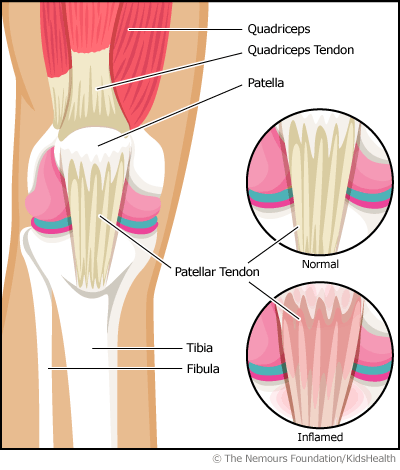Jumpers Knee
What Is Jumper's Knee?
Jumper's knee is an injury of the patellar tendon. The patellar tendon is the cord-like tissue that joins the patella (kneecap) to the tibia (shinbone).
What Are the Signs & Symptoms of Jumper's Knee?
Common symptoms of jumper's knee include:
- pain below the kneecap, especially during sports, climbing stairs, and bending the knee
- a swollen knee joint
- knee stiffness
What Causes Jumper's Knee?
Jumper's knee is an overuse injury (when repeated movements injure a part of the body). It happens when frequent jumping, running, and changing direction damages the patellar tendon. It's also called patellar tendonitis.

Who Gets Jumper's Knee?
Jumper's knee usually affects people who play sports where there is a lot of jumping and running, such as track and field, basketball, volleyball, gymnastics, running, and soccer.
How Is Jumper's Knee Diagnosed?
To diagnose jumper's knee, health care providers:
- ask about symptoms
- do a physical exam
- order imaging tests such as an X-ray or MRI, if needed
How Is Jumper's Knee Treated?
Treatment for jumper's knee includes:
- rest and taking a break from sports
- ice
- taping or wearing a knee support or strap just under the patella
- sitting with the leg raised
- ibuprofen (Advil, Motrin, or store brand) to help with pain and swelling
- massage therapy
- strengthening and stretching muscles through physical therapy or an at-home exercise program
If someone with jumper's knee does not rest the knee, the tendon can become more damaged. Although it is not common, surgery may be needed if:
- the pain does not go away
- the patellar tendon is more damaged than is typical with jumper's knee
Looking Ahead
It usually takes a few weeks to months to recover from jumper's knee.
To heal as quickly as possible, follow your health care provider's instructions about:
- which activities to avoid
- which activities are OK (for example, swimming may be fine while you heal)
- strengthening exercises
- making and keeping all follow-up doctor visits
After recovery, always stretch before and after sports, and avoid overtraining. This can help prevent jumper's knee and other sports injuries too.
Previous:Jock Itch
Next:Knee Injuries
-
’m in a play right now. You might have heard of it. Pink is my signature color.Steel Magnolias, anyone?Doesn’t that conjure up images of a red-velvet armadillo cake and big 80’s hair? The film is a cult-classic. Dolly Parton, Sally Field
-
The difference between winning and losing at basketball is often determined by which team is able to convert its layup opportunities. In other words, what team finishes at the basket most consistently. In this article I will offer some tips for finis
-
Aspergers in teenagers might affect their quality of life, including social and interpersonal skills, if not treated correctly. Asperger’s syndrome or Asperger’s disorder belongs to the group of Autism Spectrum Disorders (ASDs). Although not consider


